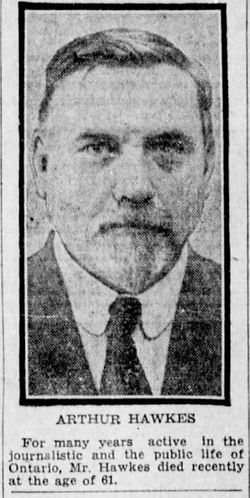He returned to Canada in 1905 as a special correspondent of the London Morning Post, and in 1907 became director of publicity for the rapidly-expanding Canadian Northern Railway, involving many thousand miles of travel. He gave the job up after three years ‘to paddle my own canoe’ and started a newspaper called The Canadian. Soon he was secretary of the Canadian National League, an organisation which opposed a planned trade agreement (‘reciprocity’) with the US and promoted trade between the provinces of Canada. MacKenzie and Dutil write ‘An expert in public relations and propaganda, Hawkes devoted his time to public speaking, writing newspaper articles, and producing campaign material, most notably his imperialist pamphlet An Appeal to the British-born…’
The campaign was successful: a change of government saw the end of reciprocity. On this and other issues Arthur Hawkes was never afraid to speak his mind in the face of opposition. One 1911 commentator remarked that ‘Mr Hawkes and other blatherskites … would find themselves very uncomfortable in a western audience …’
Later that year the Canadian government appointed him Special Immigration Commissioner, to prepare a plan to increase immigration and advise on the needs of immigrants. He was to travel around Canada, the US and England and compile a plan for co-ordinated action between the Dominion and the provincial governments. There are many newspaper reports from that time and later, of talks he gave enthusiastically promoting Canada and immigration.
In 1913 he stood in a by-election, and (predictably, in a ‘safe’ conservative constituency) he polled very badly. However, his candidacy made for an interesting election: his announcement was described as bright, racy and readable, and original in the boldness and directness of its approach to all controversial questions. One report describes him as: ‘… a clever man, a hard-working, practically tireless talker, and a comfortable, attractive personality …A big man, of specially sturdy build with a round pleasant face, shrewd but kindly eyes, a pugnacious underjaw, a sonorous easy-going voice, and store of interesting ideas and anecdotes such as few men possess.’
He was fluent in French, and having spent time in Québec he had contacts among prominent Québécois. In 1916 he took up the cause of better relations between French and English Canadians, and was one of the founders of La Ligue de la Bonne Entente (League of goodwill or ‘good understanding’), which aimed to develop better understanding and cooperation between French and English Canadians. It was prompted partly by the need for more recruits for the war, but the primary need, he believed, was to dispel the mistrust between Québec and the English-speaking provinces, particularly Ontario. This was its main focus. Later it took up the cause of language rights in Ontario schools (where teaching in French was prohibited) and ‘provided a voice for moderation and unity’.
He returned to Canada in 1905 as a special correspondent of the London Morning Post, and in 1907 became director of publicity for the rapidly-expanding Canadian Northern Railway, involving many thousand miles of travel. He gave the job up after three years ‘to paddle my own canoe’ and started a newspaper called The Canadian. Soon he was secretary of the Canadian National League, an organisation which opposed a planned trade agreement (‘reciprocity’) with the US and promoted trade between the provinces of Canada. MacKenzie and Dutil write ‘An expert in public relations and propaganda, Hawkes devoted his time to public speaking, writing newspaper articles, and producing campaign material, most notably his imperialist pamphlet An Appeal to the British-born…’
The campaign was successful: a change of government saw the end of reciprocity. On this and other issues Arthur Hawkes was never afraid to speak his mind in the face of opposition. One 1911 commentator remarked that ‘Mr Hawkes and other blatherskites … would find themselves very uncomfortable in a western audience …’
Later that year the Canadian government appointed him Special Immigration Commissioner, to prepare a plan to increase immigration and advise on the needs of immigrants. He was to travel around Canada, the US and England and compile a plan for co-ordinated action between the Dominion and the provincial governments. There are many newspaper reports from that time and later, of talks he gave enthusiastically promoting Canada and immigration.
In 1913 he stood in a by-election, and (predictably, in a ‘safe’ conservative constituency) he polled very badly. However, his candidacy made for an interesting election: his announcement was described as bright, racy and readable, and original in the boldness and directness of its approach to all controversial questions. One report describes him as: ‘… a clever man, a hard-working, practically tireless talker, and a comfortable, attractive personality …A big man, of specially sturdy build with a round pleasant face, shrewd but kindly eyes, a pugnacious underjaw, a sonorous easy-going voice, and store of interesting ideas and anecdotes such as few men possess.’
He was fluent in French, and having spent time in Québec he had contacts among prominent Québécois. In 1916 he took up the cause of better relations between French and English Canadians, and was one of the founders of La Ligue de la Bonne Entente (League of goodwill or ‘good understanding’), which aimed to develop better understanding and cooperation between French and English Canadians. It was prompted partly by the need for more recruits for the war, but the primary need, he believed, was to dispel the mistrust between Québec and the English-speaking provinces, particularly Ontario. This was its main focus. Later it took up the cause of language rights in Ontario schools (where teaching in French was prohibited) and ‘provided a voice for moderation and unity’.
Family Members
Sponsored by Ancestry
Advertisement
Records on Ancestry
Advertisement

















